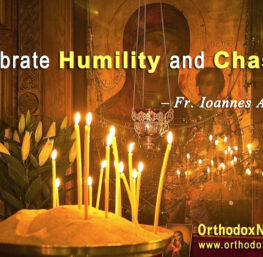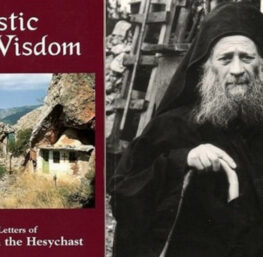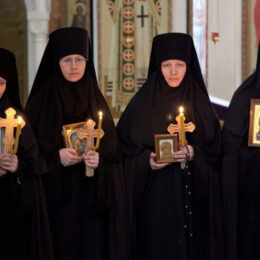President Ronald Reagan was laid to rest in the California mountains yesterday evening. He will be remembered as one of America’s great presidents. Former Prime Minister Margaret Thatcher’s eulogy, which I posted below, captured some of his qualities.
Baroness Thatcher said part of Reagan’s greatness was his magnanimity. She called it an American characteristic, which indeed it is. Americans by and large are generous of spirit and heart; it’s one of the reasons that no matter where in the world you come from, you can always be an American.
Baroness Thatcher also called Reagan "the Great Liberator," a term that will probably come to describe our former President. He ended the slavery of tyranny for millions, and when the partianship of the present time fades and people see more clearly, it will be seen as his greatest accomplishment.
May his memory be eternal.
God bless America.




“Every gun that is made, every warship launched, every rocket fired, signifies in the final sense a theft from those who hunger and are not fed, those who are cold and are not clothed.”
President Dwight D. Eisenhower
April 16, 1953
General, and President, Dwight D. Eisenhower was a greater Liberator than Ronald Reagan ever was. Not only did he liberate Western Europe from Nazi Occupation, be believed that our people at home needed to be liberated from the oppressive forces of poverty and bigoty. He was not a chickenhaw who glamorized and fetishized a military culture that he never served in, but a man who actually went to war and knew its horros and costs full well.
The honor, if you are correct, should go to Franklin D. Roosevelt and Winston Churchhill, who, like Reagan, knew the value of freedom and were able to marshall the moral resolve to fight facism as Reagan later fought communism. Reagan, remember, won the Cold War without firing a shot.
It’s a pity you cannot see the good work that Reagan accomplished. Read the interview with Nathan Sharansky titled The View from the Gulag (I am assuming you know who he is and the moral authority he commands) that I posted on main page which shows how Reagan is revered by those brutalized by the communist regime. Sharansky’s testimony (he credits Reagan with the fall of communism) puts the small minded partisanship* you display here to shame.
*(Avoid phrases like “(Reagan was a)…chickenhawk who glamorized and fetishized a military culture.” It’s unseemly language for a person who presumes to comment seriously on serious things.)
Furthermore, if the poor are as close to your heart as you profess, perhaps more criticism should be levelled towards President Clinton, who, while inheriting a roaring economy and a relative peace from the two previous administrations, largely squandered any opportunity for continued progress. It’s easy to blame an administration that relinquished power twelve years ago for the failings you see today. But what about the last eight years, when the many failures that you lay at Reagan’s doorstep remained there?
On the other hand, perhaps the point about poverty is raised not out of any authentic concern for the poor, but only as a political counterpoint to a leader you evidently despise. If you defended your points with a bit more clarity, if you did not run from the objections that are made to them, if your language was a bit less incendiary, even if you could grant the self-evident point that the fall of totalitarianism was good for the people oppressed by that brutal system, then perhaps the profession of concern for the poor would be met with a bit less skepticism by those who disagree with your liberalism.
Eisenhower was right of course. But is a long jump from his exhortation to President Johnson’s “Great Society” which, we have come to see, was a catastrophic failure. $60 billion (if I recall correctly) was spent to cure poverty, when in fact the poverty rate did not budge. The legacy of that misguided effort is the devastation of the black family — a 50% high school drop-out rate as Bill Cosby reminded us last week, absent fathers, a whole host of problems that did not exist before the programs began.
Remember too that it was President Clinton who signed the Welfare Reform Act into law. Presumably you disagree with that as well. We certainly have an obligation to care for the poor. Government has a role to play in that. But raising the old ideas and defending them as you do, is merely the recipe for continued failure. (One day I will tell you of a local effort I was involved with that actually placed homeless families back in homes. There are ways to cure these ills.)
You say that you are a student of history, but the significance of the fall of communism seems to have passed you by. Would you sing the same tune if the fall occurred under a Democratic president? If no, then your objections above are politically driven. If yes, then you don’t understand history at all.
If it’s the latter, a good place to start your self-education is Solzhenitsyn’s “Gulag” series. If you need a philosophical explication on the evils of communism read Bernard Henri Levi’s “Barbarism With a Human Face.” Levi, a former leader of the Marxist establishment of Europe, came to see the error of his ways through reading Solzhenitsyn. Both authors speak of a time gone by (thanks to President Reagan), but both remain important as cultural markers.
Finally, consider one image from the funeral services this week. In attendance was Mikhail Gorbachev, the former leader of Soviet Russia. He embraced the former First Lady. Who would have thought that the inheritor of the Soviet State would reach agreement with his greatest adversary and honor him in death? Who could imagine that this kind of accord was possible? If this is not a peace accomplished, what is it?
This past week has reacquainted me with Reagan the President, and acquainted me anew with Reagan the man. There is much to be admired and emulated: A strong faith in God reflected in his self-respect and the respect he held for the office of President. His faith drove his values of believing in the essential goodness of people and of the evils of totalitarian governments that rob people of their freedom, a love of America and the founding principles of freedom which he recognized as reflective of a Christian anthropology, a solid sense of who he was that revealed a humility which made him unswayable by criticism and praise alike, and an optimism that all things were, ultimately, in God’s hands. The remarkable love he shared with his wife was, I think, iconic of his participation in Divine Love. The media have largely been spinning these qualities as reflective of his being an actor, a “cowboy,” and “amiable dunce,” but I think it was because of his relationship with God. The Wisdom of God is foolishness to the world.
Apart from his successes and failures as President, there is the man, and since the prophesy in Jeremiah 31:31-34, reified by Christ in the Sermon on the Mount, God looks at not just the actions, but the intentions of the heart. Memory Eternal.
The most brilliant and noteworthy aspect of Ronald Reagan’s presidency was his belief that communism could be challnged and defeated. I would certainly agree that Eastern Europe in particular, owes Reagan a huge debt of gratitude. Reagan, together with Pope John Paul II ripped away the last facades of Soviet legitimacy to expose their corrupt, evil and totalitarian nature, while presenting a more attractive alternative based on faith and freedom.
The mark of a great leader however is to combine a brilliant vision and strategy with effective management and implementation of that strategy. With Ronald Reagan we sometimes saw the unfortunate results of the man’s detached and disinterested management style.
The Reagan’s admninistrations anti-communist focus was so narrow that the long term political and economic consequences of their policies were often ignored, while human rights consideratons were treated with disdain and contempt.
In Central America, Reagan’s decision to prevent Cuban-style socialism from taking root resulted in US funding, training and support for death squads and US tolerance for massive violations of human rights. One of the bitter fruits of Ronald Reagan’s central American policy was the assasination of Archbishop Oscar Romero, gunned down as he stood at the holy alter blessing the Eucharist.
In Afghanistan the Reagan administration funded, trained and equiped the Islamic fighters who would become Al Qaeda, happily ignoring their fanatical Islamic oreintation as long as they kept killing Russians. During the Reagan years America provided weapons and intelligence to Saddam Hussein, praised Osamma Bin Ladin as a freedom fighter, and denounced Nelson Mandela as a terrorist.
Because there was no plan to assist Russia’s transition from Soviet communism to capitalism, the first decade following the fall of the Soviet Union saw political and power in Russia transferred from the Kremlin to a kleptocracy of former KGB agents and organized crime. Health indicators in Russia have plummetted, and each year thousands of Russian women are abducted into a brutal and heinous white slave trade that should outrage Orthodox Christians everywhere.
In 1980 I attended a lecture given by former Secretary of State Henry Kissinger arranged in my hometown by my Republican congressman. The audience nearly gasped however when Kissinger said, “Our GDP is twice as large as the Soviet Union’s. We can easily spend twice as much on defense as they do. They will realize that challenging America is futile and give up.” It was an audacious statement at the time, but Kissinger and Reagan were correct. However the manner in which this strategy wa implemented was often careless. There were numerous military defense procurement scandals and tens of billions of dollars were wasted on the fanciful and unsuccessful Star Wars Missile Defense project, a system whose capabilities to this day remains more science fiction than reality.
This reminds us that another legacy of the Reagan administration was hundreds of billions in debt left for future generations to pay off.
The difference between Reagan and Bush on religious issues is evident today.
“Dad was also a deeply, unabashedly religious man. But he never made the fatal mistake of so many politicians, wearing his faith on his sleeve to gain political advantage. True, after he was shot and nearly killed early in his presidency, he came to believe that God had spared him in order that he might do good. But he accepted that as a responsibility, not a mandate. And there is a profound difference”
Ronald Reagan Jr., “Transcript: Reagan’s Children Deliver Remarks at Service,”
http://www.washingtonpost.com/wp-dyn/articles/A36014-2004Jun11.html
“On his recent trip to Rome, President Bush asked a top Vatican official to push American bishops to speak out more about political issues, including same-sex marriage, according to a report in the National Catholic Reporter, an independent newspaper.”
“Bush Asked for Vatican’s Help on Political Issues, Report Says,
http://www.nytimes.com/2004/06/13/politics/13george.html
Mr. Scourtes lacks the capacity to realize when he’s beaten. As soon as a better thinker than him calls him on his shameful and spiteful attempt to spit on President Reagan’s grave, he backpedals, concedes the central point as if to say, “Of COURSE that’s not what I meant” (which begs the question, “Then why say it that way in the first place?”), and then tries to come back to his point again by criticizing Reagan’s adminstration, not the President himself.
But he still tries to slip in insults to Reagan. For example, he implies that the death of Archbishop Romero can be laid at Reagan’s doorstep (as if the Guatemalan thugs who shot Romero were acting on direct orders from the Oval Office), that Reagan was responsible for the creation of Al-Quaeda (!), and that the missile-defense program was anything other than a bluff to force the Soviets one step closer to the negotiating table (a bluff which seems to have taken in Mr. Scourtes as well). Unable to take the larger picture into account, Mr. Scourtes is reduced to whining about “the cost to future generations.” But he cannot see that these things were the cost of accomplishing the supreme good of ridding the world of the evil of Soviet communism.
If Mr. Scourtes were capable of true critical analysis, of placing past events in their full context, his posts to this site would warrant more than the too-easy refutation they are receiving now.
As for Mr. Scourtes’ bizarre comparison of quotes from Ron Reagan Jr. and President Bush, he is comparing apples to oranges. He compares the loving words of a bereaved son to an article in a solidly left-liberal newspaper. Even if the two texts could stand comparison in their nature, where’s the contradiction? Is Mr. Scourtes saying that President Bush is not acting out of his own personal religious beliefs, from his conscience, as any politician should, but instead from a desire to gain power by flashing his faith around? Does he forget the severe criticism leveled at President Reagan during his time in office for doing the same? Doesn’t he understand the gauntlet of hatred any sincere Christian politician must run in this country? Oh, wait, of course not: he’s a liberal!
Let me make an important and necessary correction. Mr. Scourtes wrote:
I would certainly agree that Eastern Europe in particular, owes Reagan a huge debt of gratitude. Reagan, together with Pope John Paul II ripped away the last facades of Soviet legitimacy to expose their corrupt, evil and totalitarian nature, while presenting a more attractive alternative based on faith and freedom.
Not correct. President Ronald Reagan and Pope John Paul II did not “rip away the last facades of Soviet legitimacy…” The illegitimate nature of the totalitarian regime was evident to them all along, as it was to many others, but not to those on the left unfortunately. (Not since the Thirtes was the leftist captivity as strong as it was during the Reagan years, after the McGovernite wing took over the Democratic party after Viet Nam.)
In other words, President Reagan, Pope John Paul II, and many others were quite aware that Soviet Communism (all communism actually) was “corrupt, evil, and totalitarian.” This is precisely why they fought it. That others came to see the true nature of the Soviet Regime after it fell indicates only that they were misled when it still stood.